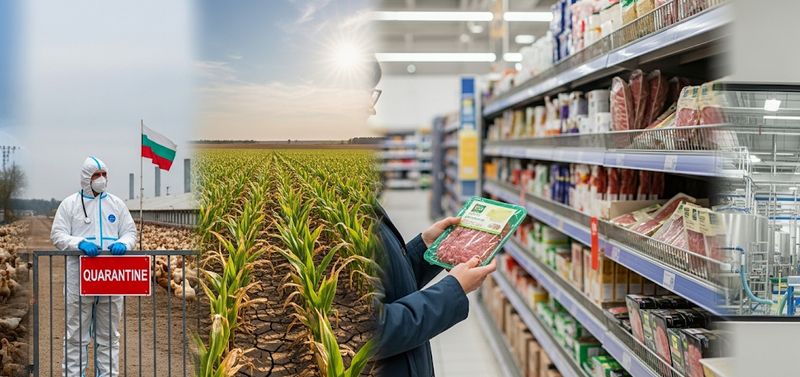
Market Pulse: Bulgarian Bird Flu, European Drought, UK Processed Meat Decline, and JBS's Plant-Based Venture
Key insights on a Bulgarian bird flu outbreak, Eastern Europe's feed supply challenges, declining UK processed meat sales, and JBS's major European plant-based launch.
Animal Health: Bird Flu Outbreak in Southern Bulgaria
What happened: Bulgaria has reported outbreaks of highly pathogenic H5N1 avian influenza on three poultry farms in the southern town of Rakovski, affecting a total of 28,000 birds. The World Organisation for Animal Health (WOAH) confirmed the outbreak, which comes as Europe faces a seasonal increase in the virus.
Why it matters: The outbreak highlights the persistent threat of avian influenza to poultry producers in Eastern Europe. The culling of birds and implementation of control measures will lead to localized supply disruptions and economic losses for the affected farms. The spread of the virus also raises concerns about potential trade restrictions and the risk of human transmission, which could have wider market impacts.
Implications & suggested actions:
Poultry Producers: Immediately review and reinforce biosecurity protocols. Monitor flocks for any signs of illness and report any suspected cases to the authorities without delay.
Processors: Diversify your sourcing to mitigate the risk of supply chain disruptions. Communicate with suppliers to stay informed about the situation on the ground.
Competitors: Be prepared for potential shifts in supply and pricing in the European poultry market. This could present opportunities for producers in regions unaffected by the outbreak.
Eastern Europe: Drought Hits Maize Yields, Threatening Feed Supplies
What happened: The EU's crop monitoring unit (MARS) has lowered its forecast for the 2025 maize crop yield, citing irreversible damage from drought and heat in Romania, Bulgaria, Hungary, and eastern Croatia. The revised forecast of 6.93 t/ha is 2% below the 5-year average.
Why it matters: Maize is a critical component of animal feed, particularly for the poultry and pig sectors. A reduction in the EU's maize harvest will likely lead to higher feed costs for livestock producers across the continent. This will put further pressure on margins that are already squeezed by other inflationary pressures.
Implications & suggested actions:
Livestock Farmers: Explore alternative feed ingredients and sourcing strategies to mitigate the impact of rising maize prices. Consider forward purchasing of feed to lock in prices.
Feed Suppliers: Keep clients informed about the evolving supply and pricing situation. Offer advice on alternative feed formulations to help them manage costs.
Retailers: Be aware of the potential for rising input costs to translate into higher meat prices. Communicate with suppliers to understand the likely impact on their businesses.
UK Market: Processed Red Meat Consumption Declines
What happened: In-home consumption of processed red meat in the UK has declined by 4.9% over the past year, with staples like ham, bacon, sausages, and burgers all seeing a drop in demand. The decline is seen across all demographics, including older consumers who are the category's traditional stronghold.
Why it matters: This trend suggests a shift in consumer preferences, likely driven by a combination of health concerns around ultra-processed foods and the ongoing cost-of-living crisis. The decline in consumption poses a significant challenge to processors and retailers who rely on these high-volume products.
Implications & suggested actions:
Processors: Innovate to create healthier processed meat options with cleaner labels and reduced levels of processing. Highlight the convenience and affordability of processed meat products in marketing communications.
Retailers: Review your product mix to ensure it aligns with changing consumer preferences. Consider promoting more natural and less processed meat products.
Industry Bodies: Launch campaigns to educate consumers about the role of red meat in a balanced diet and to address concerns about processing.
Global Market: JBS Launches European Plant-Based Company
What happened: JBS, the world's largest meat company, has announced the launch of a new company that it describes as a "new leader in European plant-based food." This move signals a significant investment in the alternative protein market by a major player in the traditional meat industry.
Why it matters: JBS's entry into the European plant-based market is a clear indication that the alternative protein sector is seen as a major growth area. This will increase competition for existing plant-based brands but could also help to grow the overall category by leveraging JBS's scale, distribution network, and marketing expertise.
Implications & suggested actions:
Meat Companies: Consider your own strategy for the alternative protein market. This could involve developing your own plant-based products, acquiring existing brands, or partnering with other companies.
Plant-Based Companies: Be prepared for increased competition from major new entrants. Focus on your unique selling points, such as your brand story, product quality, and innovation pipeline.
Investors: The entry of major players like JBS into the plant-based market is a vote of confidence in the long-term growth prospects of the sector.
Sources:
